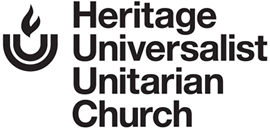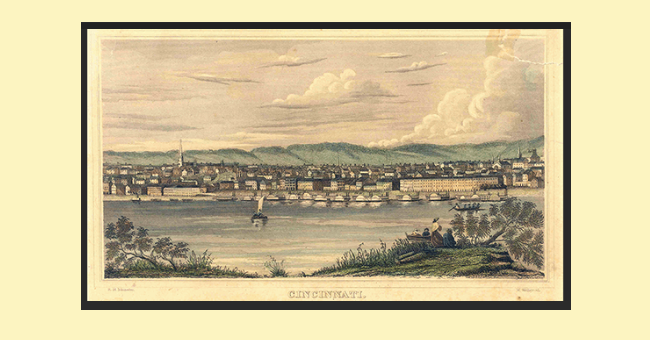by Mike Roberts, Church Historian
Most of our regular attendees are well aware that our congregation was established as The First Universalist Society of Cincinnati in 1827. At that time, the city was on the frontier of a westward-expanding population. Universalists and Unitarians alike were leaving the comfort of East Coast and New England homes to come to a rough-and-tumble city on the banks of the Ohio River. They brought their religious beliefs with them.
In that same year, 1827, our congregation raised the funds to build a two-story stone structure on Elm Street between Third and Fourth Streets to serve as their church. Both members and itinerant ministers served as preachers for the congregation until early 1829, when the son-in-law of Universalist leader Hosea Ballou arrived in town to assume the pulpit. His name was Josiah Waldo. His salary was solely based on donations from the membership, so he supplemented that income by serving as an itinerant preacher himself, visiting many small villages in Ohio and Indiana to preach the Universalist message.
The common understanding of history might lead us to believe that our country was founded on great religious tolerance and freedom – but such was not the case in the Cincinnati of 1827! The Universalist belief in universal salvation incurred the wrath of many other denominations, especially the abundant Presbyterians found in Cincinnati. Presbyterian leader Joshua Wilson often invited those of the liberal faiths to his house of worship, only to excoriate them from the pulpit.
In 1830, Wilson moved into a house directly across the street from our Universalist Church to keep an eye on the “Devil’s disciples.” In 1830, frequent attacks on the church were noted, including stones being thrown through the windows. Eventually, a culprit was apprehended – the 17-year-old son of Joshua Wilson.
Both 1831 and 1832 proved to be disastrous years for the residents of Cincinnati. Severe flooding brought great damage to the waterfront. A fire destroyed 20 buildings in the Fourth Street neighborhood. All this was followed by a widespread cholera epidemic. One of the victims of the cholera was Josiah Waldo’s wife; the illness led Waldo to relinquish his pastorate with the church and take his very ill wife back to New England. Waldo’s greatest legacy was helping to establish a regular Universalist newspaper called The Sentinel of the West. Along with several other church leaders, Waldo had started The Sentinel as a method of spreading the liberal church doctrine in the area. The newspaper was to serve the community for many decades, eventually evolving into the Cincinnati Times Star.
The difficult times in the city affected the church as a whole. Membership dwindled, attacks from the more traditional churches were frequent and unabated, and in 1832 the church sold its small building. The demise of the First Universalist Society of Cincinnati seemed imminent. But the congregation held on by a thread until its next great leader rode into town on his horse. His name was George Rogers. We will explore his story in Part 2.
Image: Cincinnati in 1830.
Image source: Pinterest.

